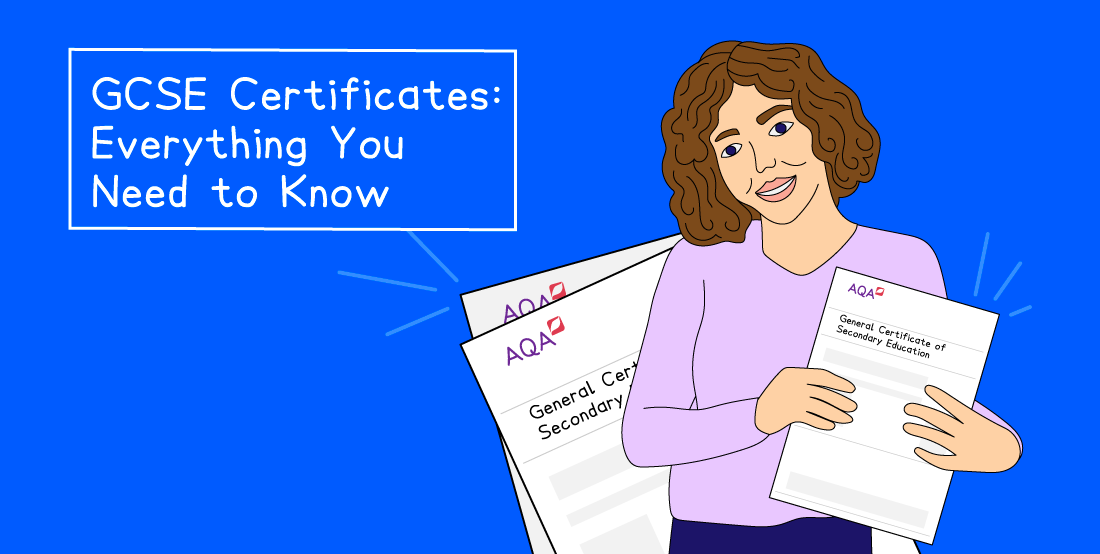Contents
- 1. What is a GCSE Certificate?
- 2. When Do I Get My GCSE Certificates?
- 3. How Do I Get My GCSE Certificates?
- 4. How Long Do Schools Keep GCSE Certificates?
- 5. What Do GCSE Certificates Look Like?
- 6. Do I Need My GCSE Certificates?
- 7. What Happens if I Can’t Find My GCSE Certificate?
- 8. How to Apply for a Replacement GCSE Certificate
- 9. How Much Does a Replacement Cost?
- 10. Additional FAQs
- 11. Ace Your GCSEs with Save My Exams
As a UK student, GCSEs are an important part of your academic journey. But once the exams are over and results day has passed, what then? Specifically, what should you know about your GCSE certificates, the formal documents that acknowledge your results? This article will provide an in-depth guide covering what GCSE certificates are, when and how you receive them, how long schools keep them, and what to do if you misplace yours.
What is a GCSE Certificate?
A GCSE certificate is the official document that proves you have completed your GCSE exams, along with giving your results. It provides physical evidence of your academic qualifications. Each certificate shows the subjects you took, the grades you achieved, and sometimes other details such as your exam board and year of completion.
GCSE certificates provide proof of your academic achievements, which is often required as part of applications for further education, jobs, or training programs. Although your GCSE results are typically available online or through your school on results day, the physical certificate is a formal document that you will need in the future for various purposes. It is essential to keep it safe, as acquiring a replacement can be time-consuming and costly.
When Do I Get My GCSE Certificates?
GCSE certificates are usually distributed several months after GCSE results day. So whilst results are usually published in late August, the certificates aren’t handed out until the autumn term, typically between November and December. This delay is to ensure that all grades are finalised, including any adjustments due to appeals or requests for re-marking.
Your school or college will inform you when your certificates are available for collection. Schools sometimes host a ceremony for the distribution of certificates. However, if you have left school or moved elsewhere, your certificates may be sent to you by post, or you may need to make special arrangements to collect them.
How Do I Get My GCSE Certificates?
Usually, you will collect your GCSE certificates from the school or institution where you sat your exams. After the results are finalised, schools receive the certificates from the relevant exam boards (such as AQA, Edexcel, or OCR) and arrange for them to be distributed to students.
If you're unable to collect your certificate in person, you may need to arrange for someone else to do it for you. Schools will usually require written consent or some form of authorisation for this, as the certificate is a sensitive document. If you've moved, many schools will send your certificate to your home address, though you may have to cover the postage costs.
How Long Do Schools Keep GCSE Certificates?
Schools are required to keep unclaimed GCSE certificates for a minimum of 12 months. So it’s okay if you don’t collect them right away, as long as you manage to collect them within that one year window.
However, note that schools are not required to store these documents forever. If your certificates remain uncollected for an extended period, your school may destroy them to free up storage space.
Some schools may hold onto certificates for several years, as a courtesy to past students. This is not guaranteed, however, so it is best to collect them as soon as possible.
What Do GCSE Certificates Look Like?
GCSE certificates are printed on high-quality paper with security features to prevent fraud. The certificate includes:
Your full name (as registered for the exam)
The subjects you completed
Your grades for each subject
The awarding exam board (such as AQA, OCR, or Edexcel)
The date the certificate was issued
Different exam boards may use slightly different formats, but the general layout is consistent between them to allow them to be read and compared easily.

Do I Need My GCSE Certificates?
The short answer is yes, you definitely do! GCSE certificates are important for many aspects of your academic and professional life. For example, you may be asked to provide them as proof of your qualifications when applying for college, sixth form or university. Some employers may request them as part of a job application process. With professional or academic jobs especially, official proof of your GCSEs may be required, particularly in key subjects like English and Maths.
Even if you don’t think you'll ever need them, it's best to keep your GCSE certificates safe. It’s a lot easier (and cheaper) to keep them in the first place, than to have to replace them once lost.
What Happens if I Can’t Find My GCSE Certificate?
If you’ve misplaced your GCSE certificate, don’t panic! It’s not the end of the world, although it can be quite inconvenient. Here’s what to do if you lose your certificate:
Contact your school: Start by contacting your school or college to see if they still have a copy of your certificate on file. If you’re lucky, they may still have a record of it. Or even if they don’t, they may be able to give you advice on how to get a replacement.
Contact the exam board: If your school no longer has a copy of the certificate, your next step is to request a replacement certificate or certified statement of results from the exam board that issued the certificate. This document officially confirms your grades and can be used in place of the original certificate.
How to Apply for a Replacement GCSE Certificate
If your original certificate is lost or damaged, you can follow these steps to request a replacement:
Identify your exam board: To request a replacement, you’ll need to know which exam board issued your certificate. The major exam boards in the UK are AQA, Edexcel (Pearson), and OCR, along with WJEC in Wales.
Contact the exam board: Visit the exam board’s website and look for the section regarding replacement certificates or certified statements of results. Relevant weblinks for the major exam boards are included in the ‘References’ section at the end of this article.
Complete the application form: Each exam board will have a form you need to fill out, which should be available online. You’ll need to provide details such as your full name (as it was at the time of your exams), your date of birth, the name of your school, and the year you took your exams.
Submit your ID: You will need to submit proof of identification (for example, a passport or driving licence) along with your application.
Pay the fee: Replacement certificates or statements of results typically require a fee, with the exact amount depending on the exam board.
Once you’ve submitted the form, ID, and payment, the exam board will process your request and send you the document.
How Much Does a Replacement Cost?
The cost of replacing a lost GCSE certificate or obtaining a certified statement of results depends on the exam board, but for the major UK boards it ranges between £30 and £60. Some exam boards may charge additional fees for express delivery or international shipping, or to replace older records. The current details regarding costs can be found on the exam boards’ websites.
Additional FAQs
Can I get my GCSE certificate digitally?
Some exam boards now offer digital versions of GCSE replacement certificates. This is not yet standard practice, however, so you should check with your specific exam board. Also, be sure to check with anyone you need to provide the certificate to, to confirm whether they’ll accept a digital version issued by the exam board.
Do my GCSEs ever expire?
No, GCSEs don’t expire. However, certain employers or academic institutions may at some point require more recent qualifications, especially if you took your GCSEs many years ago.
Can I change my name on my GCSE certificate?
In most cases no, as certificates are issued with the name you used at the time of your exams. If your name has changed since then, you'll need to present additional documents along with your GCSE certificate (for example, a deed poll or marriage certificate) to prove the change.
Exam boards may, however, make an exception in the case of gender reassignment. Check your exam board’s website or contact the board directly to find out about this.
Ace Your GCSEs with Save My Exams
Preparing for your GCSE exams can seem overwhelming, but you can significantly improve your chances of success by using the right resources. Save My Exams (SME) provides a wide assortment of top-quality revision materials, including:
revision notes
flashcards
videos
topic-specific exam questions
past papers
proven tips about what GCSE examiners are looking for
All of SME’s resources are created by experienced teachers and subject experts, and are course-specific to perfectly match the syllabus of your exam board.
Explore Save My Exams’ GCSE revision resources
References
AQA, ‘Past Results and Lost Certificates’
Pearson Edexcel, ‘Replacement Documents’
OCR, ‘Replacing Lost Certificates’
WJEC, ‘Replacement Exam Certificates’
UK Government, ‘Get a Replacement Exam Certificate’
Here at Save My Exams, we develop high-quality, affordable revision resources; consider signing up for a Save my Exams subscription to help you get the most out of your revision. We support over 1.5 million students each month in preparing for their exams and achieving successful results, we’d love to help you too.
Sign up for articles sent directly to your inbox
Receive news, articles and guides directly from our team of experts.

Share this article


 written revision resources that improve your
written revision resources that improve your